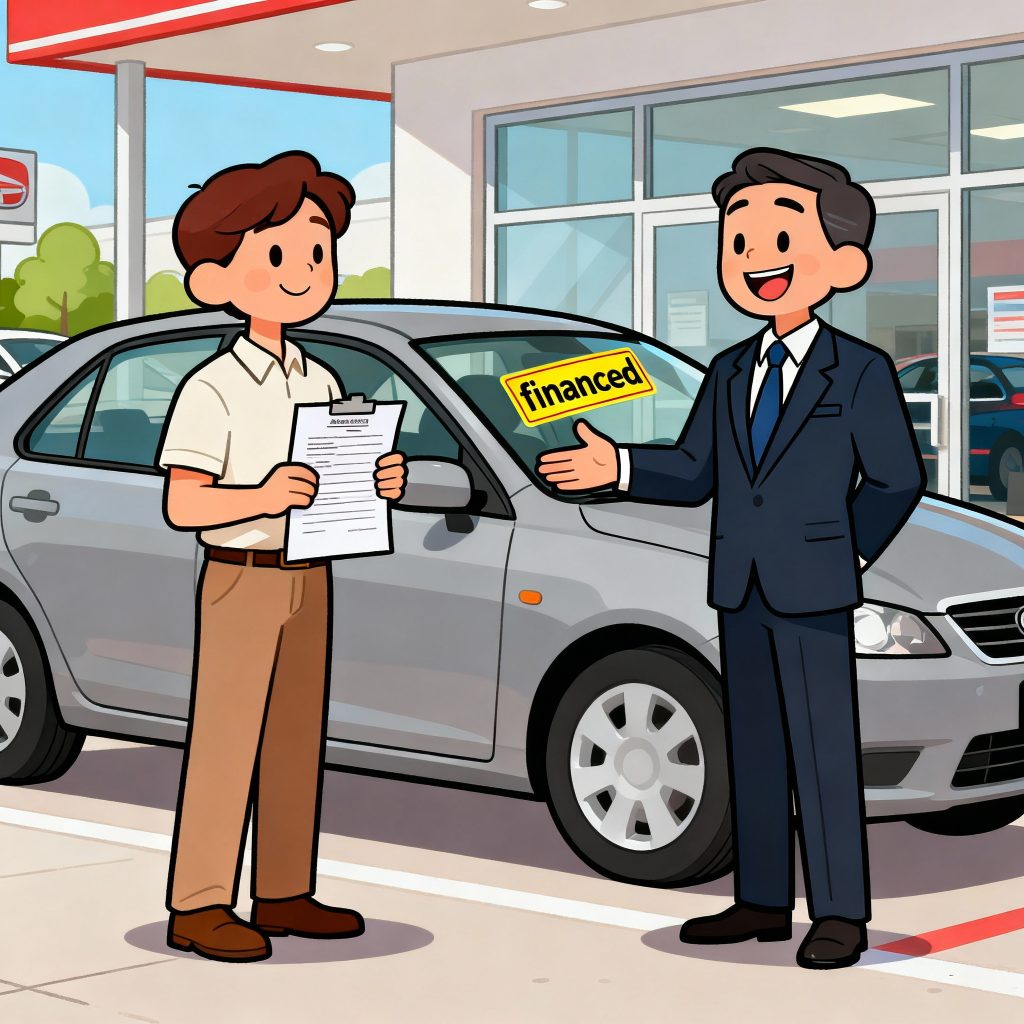Ever found yourself asking, “Can I trade in a financed car?” You’re not alone. With car prices, interest rates, and market trends constantly shifting in 2026, many young professionals and first-time buyers are exploring trade-ins while still making loan payments.
The good news? Yes, you can trade in a financed car — but the process depends on your loan balance, vehicle equity, and dealer offer. In this guide, we’ll walk you through everything — from how it works to the latest trends and expert tips to get the best deal.
How Trading In a Financed Car Works
Trading in a car that’s still under finance simply means you’re using the car’s current value to help pay off the remainder of your loan.
Step-by-Step Process
Check Your Loan Payoff Amount
Contact your lender to find out exactly how much you still owe — including any early payment fees.Get Your Car’s Trade-In Value
Use trusted valuation tools like Kelley Blue Book or Edmunds for an estimate.Compare Payoff vs. Value
If your car is worth more than your loan balance → you have positive equity.
If it’s worth less → you have negative equity.
Negotiate with the Dealer
Dealers can pay off your old loan and roll over any balance into your new car deal.Complete the Paperwork
The dealer handles most of the loan and title transfer, making the process smooth.
Positive vs. Negative Equity: What It Means for You
Positive Equity
If your car’s value exceeds your remaining loan, congratulations — that’s positive equity!
Example:
Loan balance: $10,000
Car’s trade-in value: $12,000
→ You have $2,000 equity that can go toward your new vehicle’s down payment.
Negative Equity (Upside Down Loan)
If you owe more than the car’s worth, you’re upside down on your loan.
Example:
Loan balance: $15,000
Car’s value: $12,000
→ You owe $3,000 extra — which you can:Pay off in cash, or
Roll over into your new loan (though it’s not always recommended).
Can You Trade In a Financed Car With Negative Equity?
Yes, but proceed with caution. Rolling negative equity into a new loan increases your debt load and could lead to higher monthly payments.
Smart Strategies to Minimize Risk
Wait Until You Have Equity: If possible, delay trading until the car’s value catches up.
Make a Larger Down Payment: This offsets the negative equity.
Sell the Car Privately: You might get a higher price than a dealer trade-in.
Refinance the Loan: If your credit score has improved, refinancing may reduce interest costs.
Current Trends in 2026: Trading In Financed Cars
The automotive industry has seen major changes recently:
Used Car Demand Is Strong: Many dealerships are offering higher trade-in values due to inventory shortages.
Digital Trade-In Platforms: Sites like Carvana and Vroom make it easy to get offers online, even for financed cars.
Flexible Financing Options: Banks and credit unions in 2026 offer more options for refinancing to help reduce negative equity.
EV Trade-Ins on the Rise: Electric vehicle owners are trading in older models for newer, longer-range EVs.
Pros and Cons of Trading in a Financed Car
| Pros | Cons |
|---|---|
| Quick and convenient process | May get lower value than private sale |
| Dealer handles all paperwork | Risk of rolling over negative equity |
| Can easily upgrade to a new car | Potential early payoff fees |
| Saves time vs. private selling | New loan may increase financial burden |
Tips to Get the Best Trade-In Deal
Know Your Payoff Amount – Always confirm your current loan balance before negotiating.
Get Multiple Quotes – Compare offers from several dealers and online platforms.
Fix Minor Issues – A clean, well-maintained car can boost its value.
Time Your Trade-In – Trade during high-demand months (spring and summer).
Check Market Trends – In 2026, hybrid and electric vehicles are in high demand — use this to your advantage.
Alternatives to Trading In Your Financed Car
1. Private Sale
Sell your car yourself, pay off the loan, and pocket the extra cash.
Pros: Usually yields higher value.
Cons: You handle loan payoff and title transfer yourself.
2. Refinancing
Lower your monthly payments or interest rate before trading in.
Best for: Those with improved credit or longer ownership plans.
3. Lease Takeover
Some drivers choose to swap leases or sell financed cars through lease exchange platforms to minimize losses.
How to Trade In a Financed Car Safely
Before signing anything:
✅ Read the loan payoff terms carefully.
✅ Verify that the dealer fully settles your existing loan.
✅ Get the new loan terms in writing.
✅ Ensure you receive written confirmation of the old loan closure.
Real-Life Example (2026 Scenario)
Example:
Sarah bought a car in 2022 and still owes $9,000. The dealer offers her $11,000 for trade-in. She uses the extra $2,000 as a down payment for a 2026 hybrid SUV — reducing her monthly payments by $80.
This scenario shows how positive equity can work in your favor when trading in a financed car smartly.
Common Mistakes to Avoid
Trading in without knowing your payoff amount.
Focusing only on the new car price, not the trade-in offer.
Ignoring negative equity impact on your finances.
Forgetting to cancel your auto insurance after trade completion.
FAQs About Trading in a Financed Car
1. Can I trade in a financed car early?
Yes, but check for early payment penalties in your loan agreement before trading.
2. What happens if I still owe money after the trade?
If your loan balance exceeds the car’s value, you must pay the difference or roll it into your new loan.
3. Can I trade in a car that isn’t fully paid off at any dealership?
Most dealerships accept financed trade-ins and handle the payoff directly with your lender.
4. Is it better to sell my financed car privately or trade it in?
Selling privately often earns more money, but trading in is quicker and easier.
5. How does trading in affect my credit score?
It may cause a small, temporary dip due to the new loan inquiry, but on-time payments help improve your score over time.
Final Thoughts: Trade Smart in 2026
So, can you trade in a financed car? Absolutely! But the smartest approach involves understanding your equity, market trends, and financial goals.
As a young professional or entrepreneur, your car is both a necessity and an investment. Take your time, research your options, and negotiate confidently. When done right, trading in your financed car in 2026 can help you upgrade your ride without breaking your budget.
👉 Ready to explore your options?
Check your loan balance, get a trade-in quote, and start planning your next car move today!










